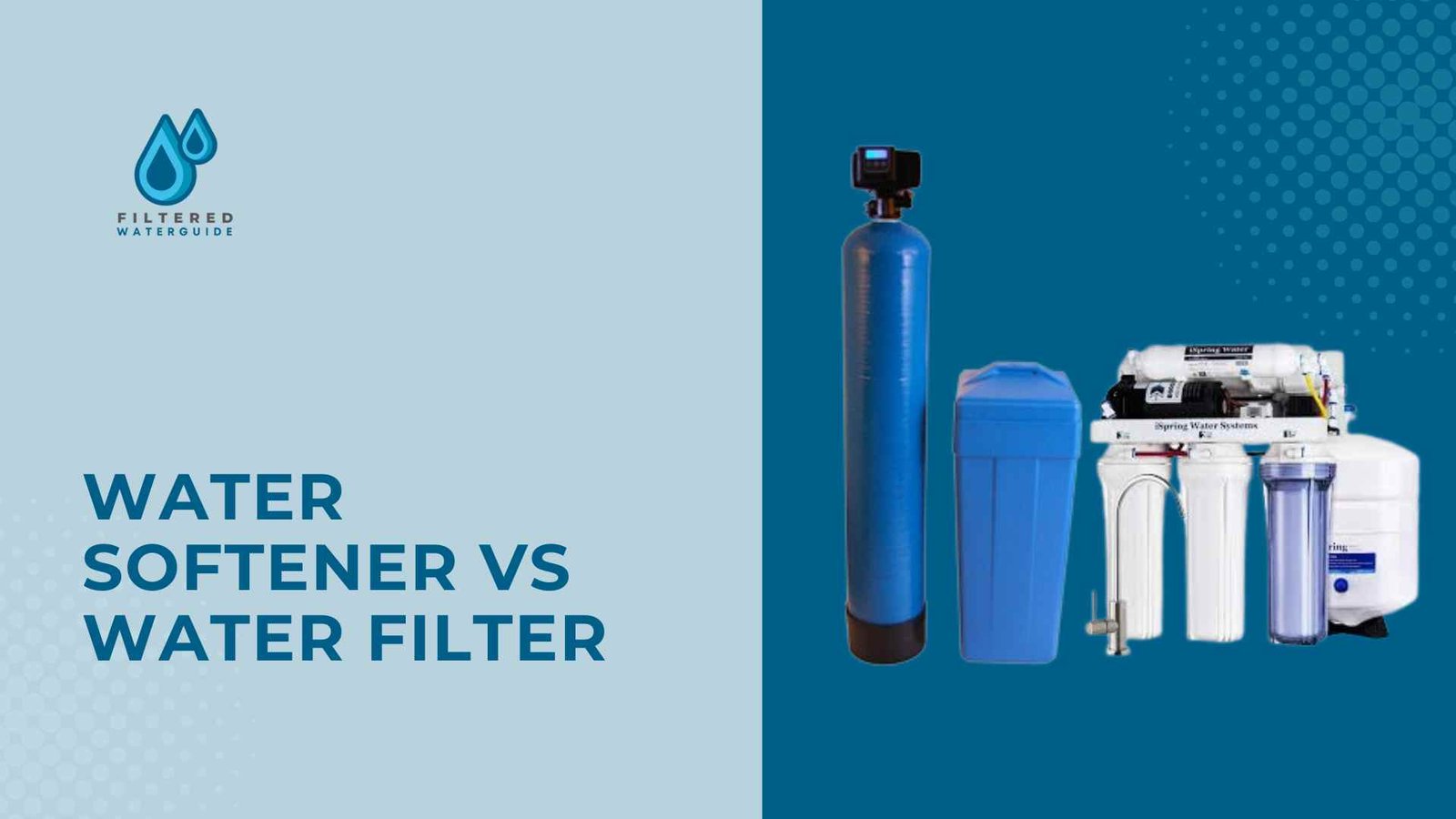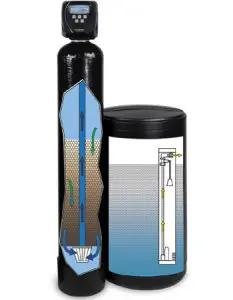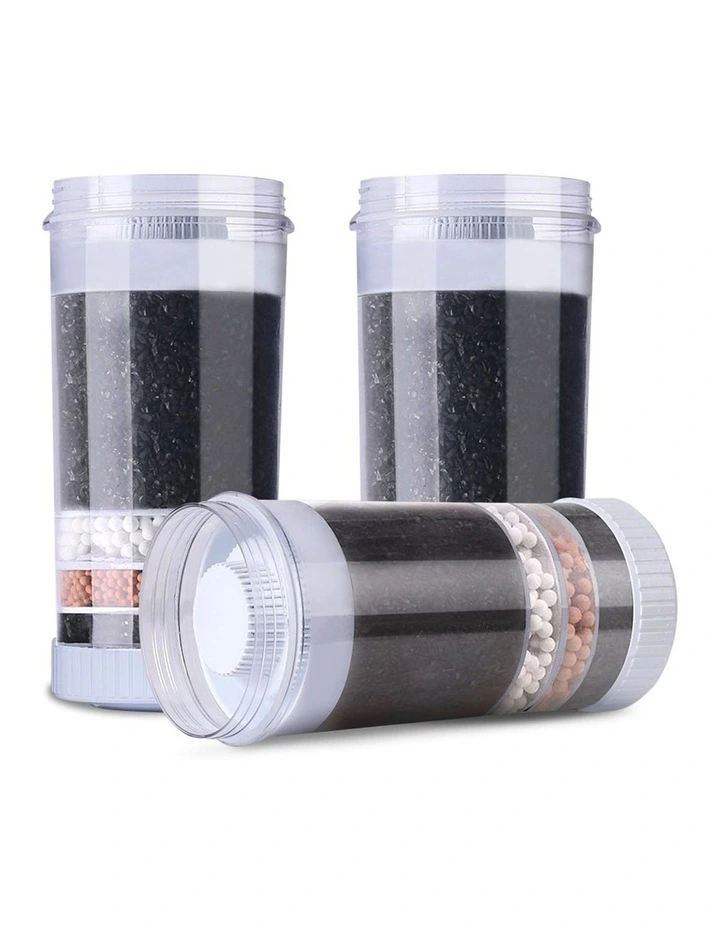Filteredwaterguide.com is supported by readers. If you purchase through referral links on our site, we make a commission at no extra cost to you. Learn more.
So you’re trying to figure out what the difference is between a water softener and a filter.
Water treatment can be confusing with all the technical jargon and different types of filters.
Very simply, a water softener is used to treat water hardness, and a water filter is used to remove contaminants.
Sometimes you may need one or the other and sometimes you may need both.
In this brief guide, we’ll run you through what these systems do, why they’re useful, and when you might need to use either one of them.

A water softener is a device that treats water to remove minerals, which are typically suspended in the water when it is drawn from the ground, before being piped into your home.
Elements such as calcium and magnesium (the minerals which make water “hard”) are removed from the water supply, which prevents the build-up of scale and damage to plumbing systems.
Hard water causes rusting, scale, issues with cleaning soap, and dry itchy skin.
These systems help prevent these annoying issues as well as extend the lifespan of your home’s appliances.

A water filter removes bad tastes and odors from the water supply as well as contaminants such as bacteria, heavy metals, and sediments.
Here are some common contaminants they can remove:
See our common water contaminants guide for more information.
The water filter’s purpose is to process the incoming water supply from either your municipal treatment plant or well and filter it to remove any harmful contaminants that could impact your health.

A water softener softens water but does not filter it in the same way a typical filter does.
If you compare the water which passes through a water softener vs a whole house filter, you will see different results in the water which reaches the tap.
When we talk about water filtration, we would expect to see a range of contaminants removed from the water supply in order to improve the water’s quality and taste.
Water softeners use salt in order to induce a chemical process in the hard water passing through the softener, causing the minerals which cause scale to migrate away from the water passing through.
The water which reaches the tap has been “softened”, but any contaminants and bacteria have not been addressed.
So no, a water softener does not filter water in the traditional sense it softens water and removes hardness-causing minerals.
To keep it brief – no.
A water filter will treat the water supply, and depending on the type of water filter used may remove bacteria, parasites, heavy metals, sediment and microplastics.
The minerals which make water “hard” are too fine to be removed using filtration only, meaning that a more direct treatment is required to eliminate the cause of scale and prevent damage to the plumbing systems.
The only exception to this rule is with reverse osmosis filtration. RO does remove hardness causing minerals but standard carbon filtration does not.
Water Softeners are installed to prevent the build up of scale in pipework and sanitary appliances such as toilets, faucets and sinks.
Scale can accelerate the wear of heating elements, prevent the natural expansion and contraction of pipework and water heaters and even block pipework over time.
Treating the issue can be time consuming and expensive if it is left, which makes the installation of a water softener so beneficial, especially in areas where the water supply is very hard.
By fitting a water softener to the incoming water supply, the minerals which cause scale are removed before they come into contact with pipework and appliances, meaning that beyond topping up the salt in the softener, ongoing maintenance to treat scale is not required.
Water filters treat the incoming water supply, improving its quality and taste by removing foreign contaminants.
Bacteria, parasites, heavy metals and sediments can all pollute groundwater, which in turn is piped into homes.
While water filters invariably improve the taste of tap water, in some areas where industrial and agricultural processes are widespread it can be vital to filter the incoming water to remove pesticides to ensure that it is safe to drink.
The difference between a water softener and a filtration system can be life and death.
Hard Water poses little danger to health and there is evidence that the minerals contained within hard water can be beneficial. Some of these, such as calcium, are vital for our bodies to function.
This means that while water softening has benefits, in particular for the maintenance of home plumbing systems, it is not a vital process.
Water filtration on the other hand can be the difference between sickness and health.
The water-borne bacteria and contaminants removed by water filtration, especially heavy metals, can cause short term illness and over time even contribute to deadly conditions.
Water filtration removes these impurities and is a simple step to make poor quality water safe to drink.
Water filtration is a critical process in areas where water could be contaminated, and can improve the taste and quality of drinking water in most homes.
Special care should be taken when drinking well water and groundwater, especially in areas with high levels of industrial activity and agriculture.
The chemicals used in these processes often seep into the land and are washed deep underground where they find their way into the groundwater. When this is extracted and piped into homes by the water authority, these pollutants can remain within the water supply and if it is not filtered cause illness in humans and other animals.
Water Softening is only necessary in areas of very hard water, or in settings where the water use is high (such as care homes or hospitals), where the volume of water used can cause a faster than usual build up of scale.
Many people like to install water softeners for peace of mind and to reduce costs incurred from reactive plumbing maintenance, but in reality water softeners are rarely vital.
Of course, if your water is discolored or has a bad smell, you need a filter.
If your toilets and taps quickly develop a layer of scale, you need a softener.
If it isn’t clear which system you might need, there are some simple tests to establish the state of your water.
A soap test kit (available from most hardware stores) can indicate the hardness of your water in just a few minutes.
A drinking water test kit also available from your local hardware store) will cost around $15 and will also clearly indicate whether there is anything in your water supply that might need to be filtered out.
You can see our water test kit page if you want to order one online.
Even if it seems fine, we recommend that everyone tests their water to establish whether they need filtration. This should be a priority after moving home to ensure that your family is protected and the drinking water is safe.
If the water is anything but pure, we strongly advise fitting a filtration system to protect your health.
Unless the water in your area is very hard, scale can usually be kept at bay with routine maintenance and descaling of appliances and pipework but if you can afford a Whole House Filtration System and a Water Softener, they are a great way to ensure peace of mind when it comes to your water supply.
Both water filters and water softeners have great benefits and improve your water supply.
Given that it is rare to have the opportunity to take action to directly reduce your chances of getting ill, water filtration systems are still underused and misunderstood and while water softeners are less popular, there is still a lot of scope for these to make our lives easier.
In summary, a water softener protects your property but a water filter ensures your health.
Check out our best water softeners for the money & our whole house filters review here.
© 2024 Filtered Water Guide. All rights reserved.